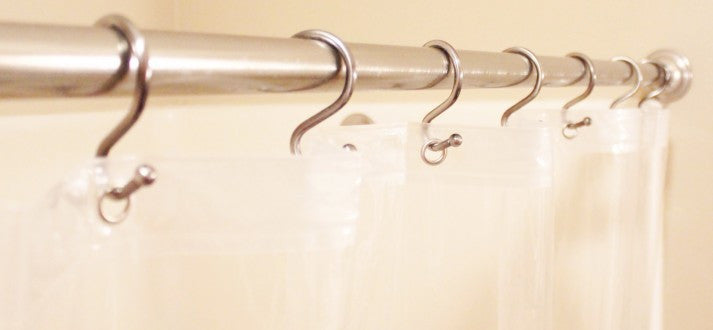
Shower curtain liners are useful for two main reasons. First, they help to keep your bathroom dry by keeping water in the shower stall or tub. This protects your floors and keeps you safe, since a wet floor is a slip hazard. Liners are also used to protect your shower curtain, keeping it dry and in good shape, which is especially important if you prefer a fabric shower curtain for aesthetic reasons.
There are several different material options to choose from, and it’s important to know the differences between them before you make a purchase. Let’s take a closer look at the most common shower curtain liner materials:
Vinyl shower curtain liners are typically cheap and effective; however, they do have some serious drawbacks. They come in different thicknesses and weights, designed to provide varying levels of protection. If you have ever purchased a cheap new vinyl liner for your home, you may have noticed a strong chemical odor that lingers for days, and sometimes even weeks. That’s because vinyl liners off-gas fumes from the toxic chemicals used to make them.
Vinyl liners are made out of PVC, or polyvinyl chloride, which contains high levels of phthalates. The toxic odor that PVC liners emit can cause symptoms like headaches and nausea. While vinyl liners are very affordable, it may be coming at the cost of your family’s health. Luckily, there are other material options available today which are considered to be safer for your health.
We recommend: Stay away from PVC or Vinyl shower curtain liners.
PEVA shower curtain liners are an excellent alternative to vinyl. PEVA stands for polyethylene vinyl acetate and EVA for ethylene vinyl acetate. They are eco-friendly, containing significantly less VOCs (volatile organic compounds), they have antimicrobial properties, and are chlorine free.
Chlorine is one of the main reasons why PVC liners emit such a terrible smell, so having a chlorine-free liner is certainly preferable for your health. You won’t have to worry about any noxious fumes off-gassing from a PEVA or EVA liner. While they do cost a little more than a cheap PVC liner, they are a better quality product and are eco-friendly.
We recommend: These premium PEVA liners at Amazon: Clear, White, or Frost
Fabric shower curtain liners provide a soft look, enhancing your bathroom’s interior design. They are also made to be water repellent, which provides protection for the floor, so they do more than simply look good. They can easily be washed and reused. You can find them made out of different fabrics, from nylon to polyester to cotton.
One of the drawbacks is that you do need to be diligent about washing a fabric liner and keeping it clean in order to prevent mold and mildew growth. They will also wear down over time, and will eventually need to be replaced. Therefore, they may be a good short-term option, but your better choice is PEVA.
We recommend: If you have a short-term need, a wide range of cheap cloth liners can be found at Amazon.
There’s a lot to consider when choosing the right liner for your shower. Ultimately, you want to select a product that meets your needs and fits into your budget. You can make an eco-friendly choice that is still affordable and yet safe for your family.